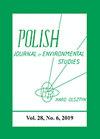Decoupling Analysis between Carbon Emissions, Sewage Emissions, and Fishery Production in China
IF 1.3
4区 环境科学与生态学
Q4 ENVIRONMENTAL SCIENCES
引用次数: 0
Abstract
In this study, we applied decoupling theory to explore the link between carbon emissions, sewage discharge, and fishery output growth in China from 2012 to 2021. The research results indicated that during the research period, the relationship between carbon emissions and fishery output was mainly weak decoupling, while the relationship between sewage discharge and fishery output was weak decoupling and expansive negative decoupling. Carbon emissions and sewage emissions were weak decoupling for most of the time. At the same time, the article defined the relationship between the environment and fishery production based on the decoupling state between the three, which are environmentally friendly, conventional, and polluting. It was discovered that China’s fishery production and environment still exhibit a polluting state. This means that there is a need for green and coordinated development of fisheries production and the environment, and corresponding measures must be taken. As a result, we have proposed policy recommendations that include optimizing aquaculture models, strengthening technological innovation and promotion of new technologies, and strengthening government supervision, management, and policy support.中国碳排放、污水排放和渔业生产之间的解耦分析
本研究运用解耦理论探讨了 2012-2021 年中国碳排放、污水排放与渔业产量增长之间的关系。研究结果表明,在研究期间,碳排放与渔业产量的关系主要是弱脱钩,而污水排放与渔业产量的关系是弱脱钩和扩张性负脱钩。碳排放与污水排放在大部分时间内呈弱解耦关系。同时,文章根据环境友好型、传统型和污染型三者之间的脱钩状态,界定了环境与渔业生产之间的关系。研究发现,中国的渔业生产和环境仍然呈现出污染状态。这意味着渔业生产与环境需要绿色协调发展,必须采取相应的措施。因此,我们提出了优化水产养殖模式、加强技术创新和新技术推广、加强政府监督管理和政策支持等政策建议。
本文章由计算机程序翻译,如有差异,请以英文原文为准。
求助全文
约1分钟内获得全文
求助全文
来源期刊

Polish Journal of Environmental Studies
环境科学-环境科学
CiteScore
3.10
自引率
11.10%
发文量
430
审稿时长
4 months
期刊介绍:
One of the most important challenges facing the contemporary scientific world are problems connected with environmental protection. Intensive development of industry and agriculture has led to a rise in living standards on one hand, but an increase in environmental degradation on the other. This degradation poses a direct threat to human health and life. Solving these ever-increasing problems which seriously endanger our civilization require the united efforts of scientists and field researchers of many branches.
The "Polish Journal of Environmental Studies" publishes original papers and critical reviews on the following subjects:
-Basic and applied environmental pollution research, including environmental engineering
-Pollution control of atmospheric, water (marine and fresh), soil and biological materials
-Determination of harmful substances, including their metabolic breakdown patterns
-Analytical methods for metabolic breakdown patterns or other chemical degradation patterns in the environment and in biological samples
-Development of new analytical methods, instruments and techniques for controlling pollutants
-Circulation of pollutants in the environment and their effect on living organisms
-Environmentally oriented catalysis
-Hazards to human health and safety
-Waste utilization and management
-Land reclamation
-Conference reports, scientific and technical reports and book reviews
 求助内容:
求助内容: 应助结果提醒方式:
应助结果提醒方式:


